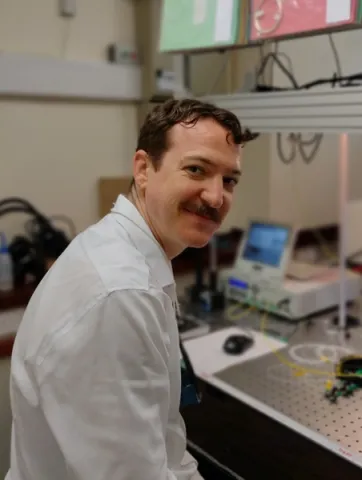About the project
A miles-long glass tube thinner than a human hair enshrouds delicate glass capillaries with sub-micron thickness; this is Antiresonant hollow-core optical fibre, the next generation of fibre technology already creating new fields in data, quantum, sensing and healthcare. This project explores deploying these novel fibres in compact coils for sensing.
Antiresonant hollow core fibres guide light in a fundamentally unique way, offering novel properties which are revolutionising photonics. At the heart of next generation ultra-precision sensors, is the ability to pack kilometres of these fibres into a device no larger than a teacup. However, unlocking ultra-high performance in these coils requires a new level of precision and insight. This project will explore ways to deploy these novel fibres, using interferometric and machine vision techniques to perform ultra-precision monitoring of fibre deployment.
Through this project you'll :
- design and build a bespoke fibre coiling system from the ground up
- develop and deploy novel optical interrogation techniques to monitor fibre performance in situ
- experimentally optimise coil and fibre geometry to enhance sensing capabilities
A key focus of the project involves construction of a one-of-a-kind system integrating devices and sensors spanning domains: mechanical, electrical, optical, and software. The project is thus particularly well-suited if you're someone with a strong multi-disciplinary skillset and good hands-on engineering skills. You'll join the world-leading Hollow Core Fibre group, with access to cutting-edge facilities and strong collaboration with industry partners. You'll receive detailed training on an array of optical sensing techniques which will support the system build, and you'll be given the resources and trust to put your ideas into practice. Through our deep industry links, the knowledge you create will find immediate use, pushing the boundaries of capability in today’s most advanced fibre-enabled gas sensors, gyroscopes, and more.
The School of Optoelectronics (ORC) is committed to promoting equality, diversity inclusivity as demonstrated by our Athena SWAN award. We welcome all applicants regardless of their gender, ethnicity, disability, sexual orientation or age, and will give full consideration to applicants seeking flexible working patterns and those who have taken a career break. The University has a generous maternity policy, onsite childcare facilities, and offers a range of benefits to help ensure employees’ well-being and work-life balance. The University of Southampton is committed to sustainability and has been awarded the Platinum EcoAward.

